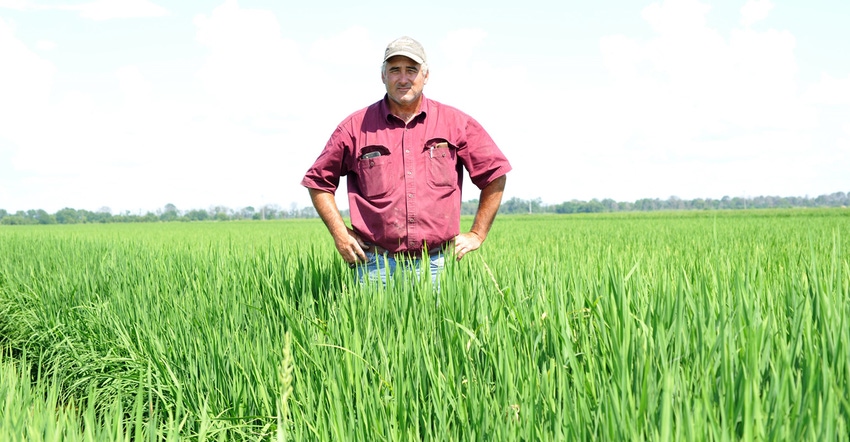April 1, 2018

Sponsored Content
Rice growers can add a new solution to their 2018 weed management programs. Loyant™ herbicide with Rinskor™ active presents a new class of chemistry to an industry that hasn’t had a significantly different herbicide solution in years.
In 2017, rice producers Mitch Wilson and Hunter Carter participated in the Dow AgroSciences Field Forward™ program. The on-farm trial offered an opportunity to experience Loyant herbicide before it was commercially available.
Broad-spectrum control changes weed management for Mississippi grower
By Wilson’s estimate, he has been spending $45 per acre in rice fields where he’s battling herbicide-resistant barnyardgrass.
Before adding Loyant to his herbicide program, the grower from Linn, Mississippi, struggled with resistant grasses for almost a decade.
“We had yield-destroying barnyardgrass. It consumed large areas of our fields, taking out other grasses and our rice crop,” Wilson says. “Our barnyardgrass is resistant to almost every herbicide that’s labeled for rice. We couldn’t kill it, and it eventually would come back.”
Wilson credits Mississippi State University Weed Specialist Jason Bond with suggesting a new herbicide plan to manage resistant barnyardgrass and other weed issues, including sprangletop, broadleaf signalgrass, coffeebean, morningglory, pigweed, and purple and yellow nutsedge.
Wilson put Loyant™ herbicide to the test in 2017 to evaluate the efficacy.
“We put Loyant under extreme pressure, and it did amazingly well on barnyardgrass, large coffeebean and morningglory,” he says.
In his test plot, Wilson applied Roundup®, Sharpen and Command herbicides at planting, followed by a pre-flood treatment of Loyant.
Wilson says there’s no doubt the broad-spectrum control in Loyant is a game-changer.
“Before Loyant, good control has always required two applications of a herbicide, one at emergence and one at pre-flood,” he says. “That’s the way it’s been all my life.”
Arkansas producer: ‘You name it, and we’ve sprayed it.’
Arkansas rice producer Hunter Carter says he’s willing to try anything to control the multitude of weeds in his rice field. After hearing good things about Loyant™ herbicide, he and his brother Drew tested it on their operation, Carter Brothers Partnership.
“You name it, and we’ve sprayed it,” Hunter Carter says. “We have such high levels of resistance with barnyardgrass and sedges that we’ll try anything. I know the result of untreated weeds, and that’s crop failure.
“We can control the resistant grasses, but we have to use three different chemicals to do it. With Loyant, we only need one.”
His test field for Loyant received a burndown treatment of Roundup and Command followed by an application of RiceBeaux herbicide. At the four- to five-leaf stage, he followed with a tank-mix treatment of Loyant and pendimethalin for residual activity.
Hunter Carter says Loyant™ herbicide provided excellent control of a broad spectrum of weed species.
“It worked wonderfully. It did everything we’d heard it could do,” he says. “It provided complete control of all the grasses and the sedges that were present in the field.
“There are a lot of advantages to the broad-spectrum activity Loyant offers. You don’t use a lot of chemical, you don’t have any mixing problems and it offers a broad spectrum of control.”
Visit LoyantProtects.com for more information, field expert videos and field images.
™Field Forward, Loyant and Rinskor active are trademarks of The Dow Chemical Company (“Dow”) or an affiliated company of Dow. ®Roundup is a registered trademark of Monsanto Technology LLC. Loyant and Rinskor are not registered for sale or use in all states. Contact your state pesticide regulatory agency to determine if a product is registered for sale or use in your state. Always read and follow label directions. ©2018 Dow AgroSciences LLC
About the Author(s)
You May Also Like




